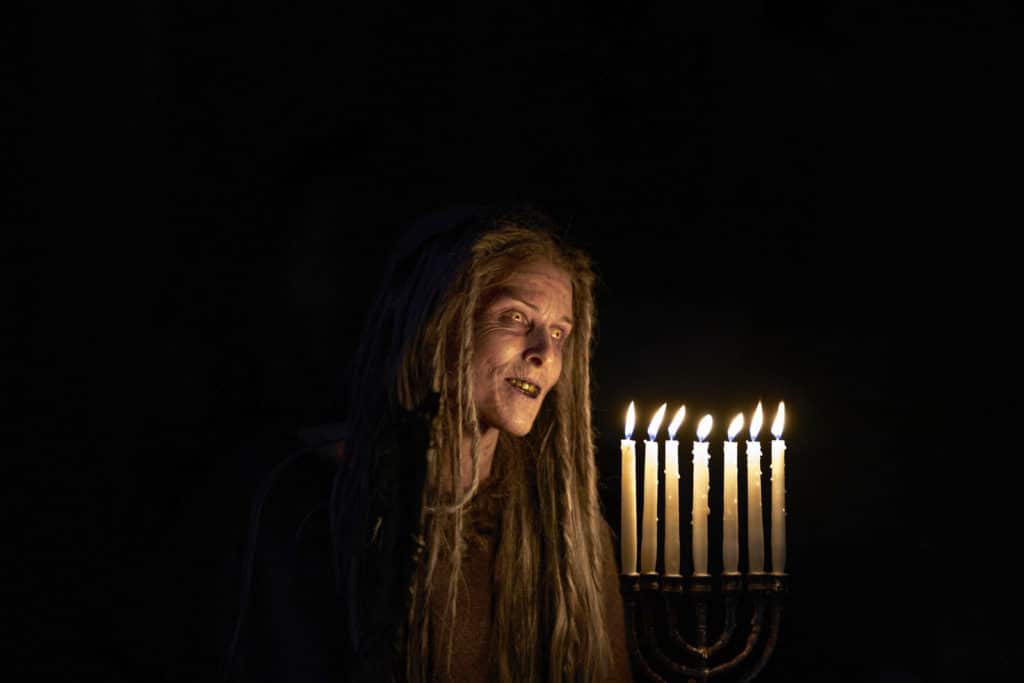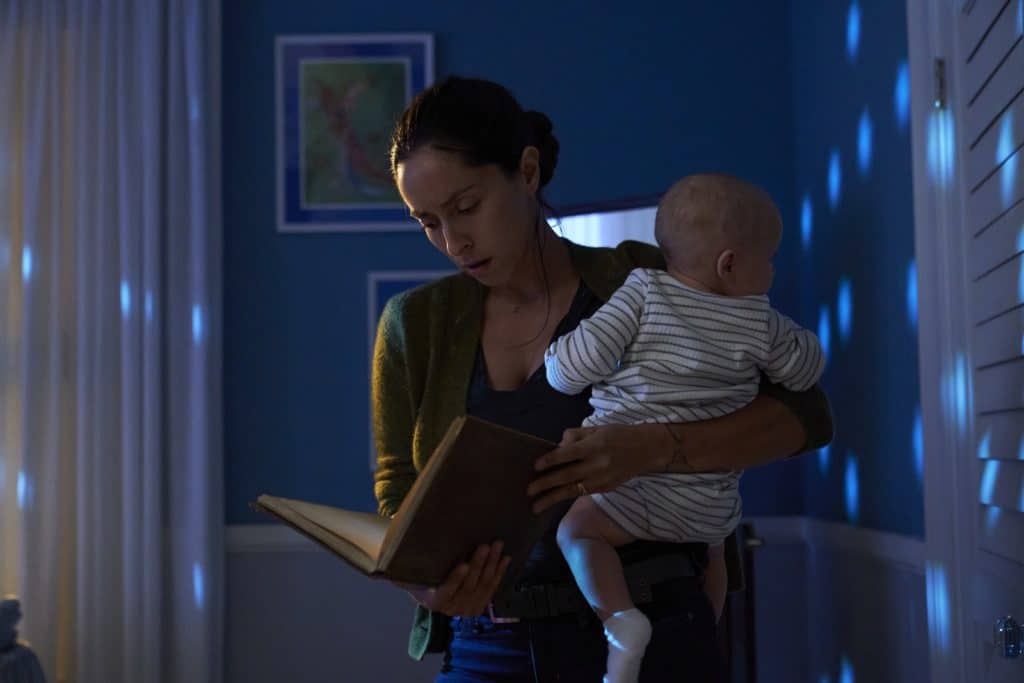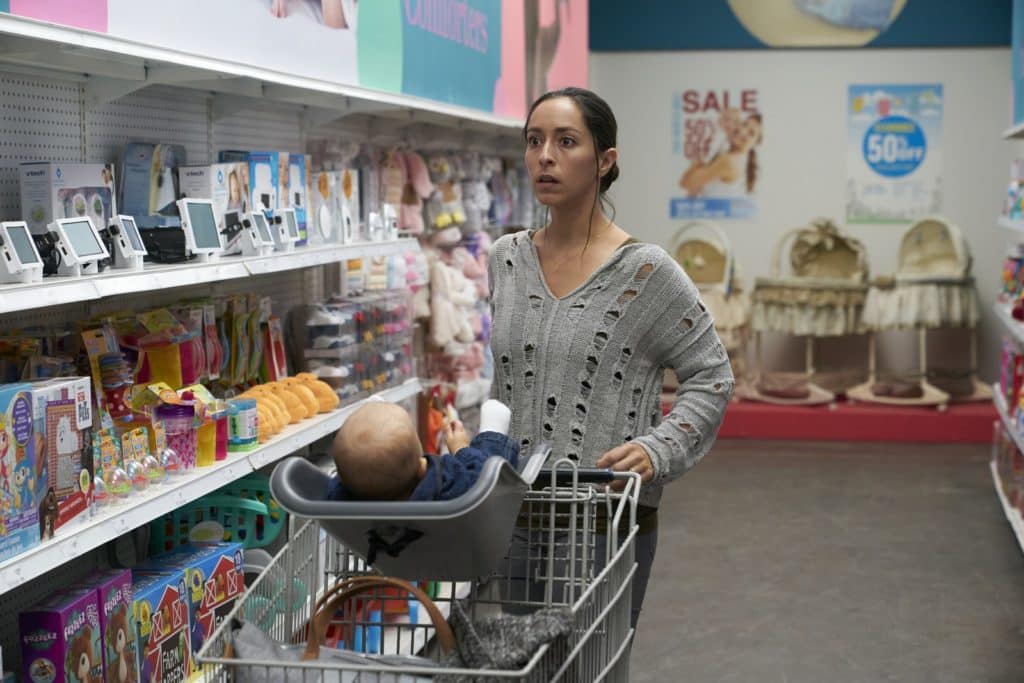Alex Greenfield is a screenwriter who gets to work on projects tied to two of his passions: horror and wrestling. With writing partner Ben Powell, Greenfield has scripted 2012’s The Temple, 2015’s The Sand, and most recently, Lullaby. Alongside writing scary movies, Greenfield has had a long career within the wrestling industry. From 2005 – 2007 he was a key writer for the WWE, working closely with none other than Dave Bautista. These days Greenfield is a part of MLW (Major League Wrestling). THN first spoke to Greenfield back in 2015 when The Sand screened at UK’s FrightFest. After eight years apart, we caught up with him to find out about his Jewish horror, Lullaby.
Starring Oona Chaplin, Lullaby sees one woman’s nightmare come true when her child is targeted by the monstrous Lilith after unknowingly singing her child a strange lullaby with summoning powers. Lullaby is directed by cinematographer-turned-director John R. Leonetti and took several years, and one pandemic, to come to fruition. With the film now finally out in the world (available on Digital HD in the UK and a recent Hulu addition in the US), we spoke to Greenfield about the lengthy process of the film’s production.
Since we last spoke, the horror genre seems to have exploded in terms of its popularity. What do you think has changed, either about the genre or our society, that has opened it up to more attention?
I think when you boil it down, it’s Jordan Peele. I feel like Get Out was the turning point. While other people will try to say it’s anything but, Jordan always says “no, it’s a horror movie.” I love him for that. I feel like Get Out didn’t start anything, but it reminded people of what horror has always been good at in a cyclical way, from Night of the Living Dead to all of the social horror in the late 70s and early 80’s. We go through waves of it and maybe for a while people had forgotten that horror is a good genre mirror for society. Peele reminded people of that; this sort of open Jewishness of Lullaby is definitely an outgrowth of Peele. We wouldn’t have thought to make that part of the movie in the same way before being influenced by that. I think that’s true of a ton of filmmakers right now.
As to the relationship with society, that’s the interplay between art and artists. We are in a particularly dark and riven time culturally, and that’s always where horror excels. You look at the Vietnam War and all of the great horror that emerged with Craven, Carpenter, and Tobe Hooper. The reaction to 80s acquisitiveness and horror that decade; when shit goes wrong, horror comes to life, it’s fantastic.
I’m looking at the superhero genre right now. It had been the genre for a decade, so this could just be the natural cycle, but I feel like in a whole lot of ways we are in the midst of a dramatic shift. I don’t know where people are going to land, they’re not holding out for a hero – that’s what it seems like to me. I don’t know if they’re gonna hold on to horror in the way that they have. I worry we’re at the crest of the wave right now.
Jewish horror is somewhat of an untapped vein. Why do you think it’s now getting its time to shine?
I am Jewish, so I can say it – I think there’s an exoticness to Jewishness to the broader culture. We’re in the news a lot these days, for a lot of bad reasons because antisemitism is on the rise. But I think that’s also opened a lot of people… I’m pretty unobservant in my own life. But I’ve had more people who are not Jewish, ask me about various aspects of Judaism many times that I have no answer for than I ever have before. So I think paradoxically the wave of anti-Semitism that began five to seven years ago has continued and escalated. I think some of that has also opened up a curiosity for a vein that horror is quick to tap.
As soon as Jordan Goettling, the first producer at Heroes and Villains we talked to, mentioned Lilith, I was “oh shit. This is our opportunity to tell a really steeped in Judaic myth story. I think it’s unusual. The default horror religion has been Catholicism. You’re starting to see some great films out of the Islamic tradition too right now. I think we’re kind of opening up, you know. Japan and Korea have had their kind of own thing for a long time. The Jews are largely a diaspora, spread all over the world. I think people are just interested in this neat, new, scary mythology – not that the overall mythology is scary – but making use of it that way. The Rabbi character in Lullaby is one of my favourites I’ve ever written. That was a blast. Rabbi exposition.

Similarly, Lillith isn’t a character that has been seen too much over the years, my main experience of her came via Supernatural, what about her story stood out to you?
I will give credit where it’s due, so Ben Powell, my writing partner and I were brought in on Lullaby. We had a script that was featured on The Blacklist called The Vessel. It ended up selling, but then the company folded, just closed its doors one day, so that was a big bummer. Jordan Goettling, who was development executive at Heroes and Villains Entertainment, had read that script when it was featured on the Blacklist. She brought us in to meet with her and Markus Goerg and a bunch of others to present an idea that they had. They presented us with the raw idea. Lilith was always a part of that. The germ of it was a lullaby that doesn’t keep Lilith away, but in fact summons her, that was the high-concept beginning of the project.
There’s a lot of great Wiccan stories you could tell that are Lilith centric. She appears in a bunch of traditions including many that predate Judaism by a long way. She is that famous Bas-Relief of the Goddess with the owls and the lions at her feet. Some people think that’s the first representation of Lilith and that’s 5,000 years old. I don’t know that I believe that, but it’s clear that what became Lilith in a funny way predates Yahweh. She predates the singular God that has become in Jewish myth, the one who raises her and casts her out of heaven. I don’t claim Jewish ownership over her, but I do claim a very long intertwined and woven tradition of Lilith popping up in Jewish mythology, from Byzantium forward. It is written after the fact that, when Cain and Abel are on their way to the Garden, in which Cain commits the first murder, murdering Abel, what they are discussing is, and different traditions say it different ways, but they are discussing Adam’s first wife. That is the disagreement that brings them to blows and starts Lilith merging into the tradition.
I could go on about Lilith forever, I researched the shit out of reading about her. She’s just a great antagonist, and thank heavens for Oona Chaplin. We always saw her as a sympathetic monster, but that got taken away and various drafts steered more into just monster monster and thank heavens when Oona Chaplin came on board. She wanted a much more sympathetic Lilith so that spared us some grief.
Lullaby was one of the first films to be impacted by the pandemic, how did it affect production?
Oh my God, it was so brutal. We were supposed to start late January / February 2020. We hit some construction delays that pushed it back a month. I think our start date was March 20th. It was either after SXSW got cancelled, or an NBA game got cancelled, right before the dudes were walking out onto the court. That’s when I was like, “this is real.” You kind of knew something was coming, but then we started seeing pictures of the refrigerator trucks in New York City and it was, “oh my God, there’s no way this movie is happening.”
So we got delayed. At first, it was three weeks to stop the spread, and a three-week temporary delay. Then it moved out to six weeks and then we were off to the Races with “oh God. Is this going to happen?” The sets were built in Toronto on a lot, but we just had no idea what was going to happen. Then in the middle of August, we got a call from the producers and John R. Leonetti, the director, to start some rewrites. I can’t believe we rode this horse all the way through to production. They started shooting and then there were one round of re-shoots, and there was a second round of re-shoots. From commencement of photography to being done with the last re-shoots, was over eighteen months.

I’m thrilled that Oona Chaplin was able to stay with the film, I know you’re a fan of hers.
I literally started bouncing around my kitchen, ironically singing The Rains of Castamere. I’m such a Game of Thrones nut, and of course Oona was Rob Stark’s love interest and was – spoilers – killed in the ‘Red Wedding’. In the Kevin Bacon game of life I am one degree away from Game of Thrones, which just tickles me absolutely pink. She was lovely. She was knowledgeable about Lilith walking in the door and having the star of the show come in, on your side in a battle, with the producers, makes you feel pretty good. Oona coming in really made the save on the presentation of Lilith as someone who’s not just a Bugaboo jump out of the closet jump-scare machine.
There’s a lot of parental anxiety laced within the film, even before Eli has come under threat, where did that come from?
I will pass a lot of the credit for that act one to Ben. Obviously there’s inspiration from The Babadook built into the DNA. Oh my God, I hated that kid by the middle of the second act. That was definitely an inspiration, but most of that was Ben. Ben has twin boys. So a lot of what Rachel goes through in that montage of her day – not being able to do anything and having to take the baby to go to the bathroom – I think that’s such a universal experience and that was all Ben. It was great work from my boy who really tapped into his own experience. They’re nineteen now, but he tapped into that early childhood vein of just trying to juggle life. I think he was a little traumatised writing.
One of my most fun moments, and one of the things I thought Leonetti just nailed was, that great little moment after they bring little Eli home. It’s just this beautiful moment. The music is swelling, and they’re walking down the hall… and then you start to hear the crying and they do the Indiana Jones shot and cut to the wide shot of the building and you just hear the crying echo and echo.

John Leonetti is well versed in horror, how do you think his experience helped shape the idea?
He’s a really cool guy. The first thing I talked to him about was there’s this great sequence in the first Annabelle. There are these drawings falling down on the staircase and our heroine slowly walking up the stairs. My first conversation with John, I put that over and I’m, “that’s the feeling here of what we’re going for.” He was a very fun collaborator and he was great to work with.
You’re currently working on a video game, how’s that going, and what other projects are you juggling?
I’m working for 2K on a AAA title that will surprise nobody, who’s read my IMDB. It’s a blast. It’s a really cool group of creative people. I’m learning this as I go. So I’ve just sort of moved past the outlining stage. We’ve done our big presentations of our game mode to all of these designers and engineers and people who create AI and stuff. The whole experience is playing in a brand-new toybox, doing the same sort of thing that you do in film writing. Except I’m even using new software because Final Draft can’t handle all of the choices we make. It’s like going from formal poetry to blank verse. I’ve got a whole new dimension in what screenwriting is.
Ben and I have a couple of specs that are in various states of a producer doing this with them, or producers doing that with them. And I have a pro-wrestling show in the United States on Reels on Tuesday nights at 10, it’s called MLW Underground. Those who like horror stories… we’ve definitely got some bits that you will get into, but it’s a big fun wrestling extravaganza with a grittier edge, sort of like the old ECW. So I’ve got a lot going on.
Speaking of wrestling, you must be so proud of your boy Dave Bautista.
Holy crap right?! I go back and forth with him sometimes. He was amazing in Knock at the Cabin. I read Tremblay years ago, when Stephen King put over A Head Full of Ghosts, and it is just a marvellous novel. Seeing his success is great. But then seeing Dave mature, it’s a treat. I only worked with [John] Cena the smallest bit, but it’s awesome to see the kind of performer that he’s become. I’ve been saying for years that wrestling is a mill for really talented people, because it’s live theatre; they are not the last people you’re going to see come out of wrestling.
Lullaby is out on Digital HD in the UK and US. Lullaby is also available in the US via Hulu.
Kat Hughes is a UK born film critic and interviewer who has a passion for horror films. An editor for THN, Kat is also a Rotten Tomatoes Approved Critic. She has bylines with Ghouls Magazine, Arrow Video, Film Stories, Certified Forgotten and FILMHOUNDS and has had essays published in home entertainment releases by Vinegar Syndrome and Second Sight. When not writing about horror, Kat hosts micro podcast Movies with Mummy along with her five-year-old daughter.

Latest Posts
-


Netflix
/ 2 days ago‘Zero Day’ teaser; Robert De Niro leads the Netflix film
Robert De Niro is leading out the upcoming Netflix series Zero Day, a teaser...
By Paul Heath -


Film News
/ 2 days agoChristopher Nolan’s next film is ‘The Odyssey’
After what seems like months of speculation, it has finally been revealed that Christopher...
By Paul Heath -


Film News
/ 2 days agoOne more trailer for Bob Dylan biopic ‘A Complete Unknown’
A final trailer has been released for A Complete Unknown, the Bob Dylan biopic...
By Paul Heath -


Streaming
/ 2 days agoWhere Could TV Streaming Apps Go from Here?
It’s been a long time since Netflix alone dominated the smart TV streaming space....
By Paul Heath














